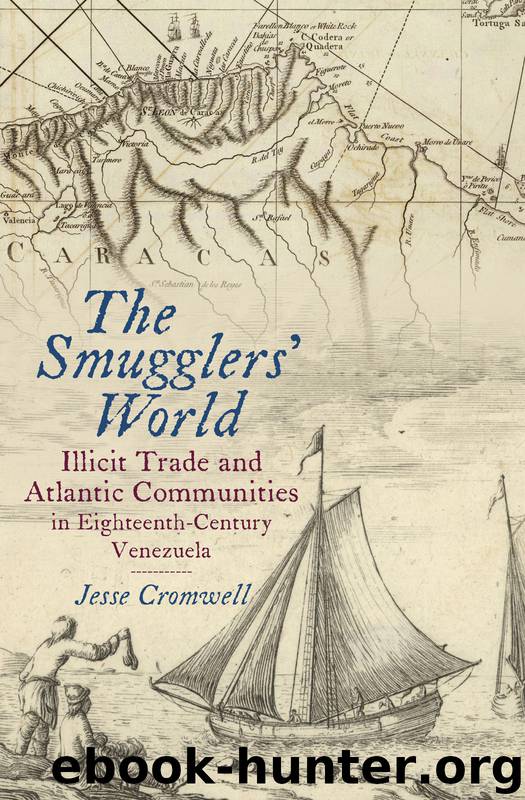The Smugglers' World by Cromwell Jesse;

Author:Cromwell, Jesse;
Language: eng
Format: epub
Publisher: Omohundro Institute of Early American History & Culture
Published: 2018-03-04T16:00:00+00:00
5
The Societal Ties of Smuggling
Venezuelan Merchants
Although Dutch, British, and French smugglers were resourceful bearers of unfettered trade, their livelihoods depended on the patronage of Spanish colonists. Traders from Spanish America responded to market inefficiencies or outright breakdowns in the imperial commercial system with independent commercial solutions. By trafficking directly with foreigners on their own shores, and occasionally abroad, they cut out layers of middlemen. It seems self-evident that Spanish American traders on the periphery would seek the broadest possible autonomy from laws created by metropolitan bureaucrats unexposed to Spanish American commercial conditions. They were also frustrated with the dominance of peninsular merchants in the Spanish Atlantic system. Nevertheless, the choices made by domestic merchants involved in interimperial trade were more complicated than this peninsular-creole divide reveals. Venezuelan coastal inhabitants’ political and commercial identities operated on multiple registers. For them, being Spanish subjects, interimperial consumers, and local community members were not mutually exclusive positions. Unlike their itinerant, non-Spanish trading partners, Venezuelan merchants had to grapple with the distinct social contexts of conducting criminalized business in their own homeland.1
Spanish commercial law placed those who welcomed smugglers in a truly difficult position. Aside from the nationality of their trading partners, the commercial practices of Spanish American smugglers were similar to those of their counterparts who trafficked in legal wares. They studied market conditions and bought and sold the goods they needed at the best prices they could negotiate. By every conceivable metric, historians would call them merchants. Yet, in their correspondence, Spanish royal officials might describe their subjects who practiced unlicensed trading with outsiders as traitors and even rebels. One prize court justice in 1718 wrote to his superiors that Venezuela was “a land of uprisings … because every subject is friends with the Dutch and between the two groups there are a thousand entanglements” (enredos). Nevertheless, a crucial circumstance separated these cohorts. Whereas foreign smugglers could sail from anchorage to anchorage conducting what Spanish authorities deemed illicit business and then return home, Spanish American contrabandists had to complete most of their transactions in the same legal jurisdictions where they lived.2
Internal contradictions attached to illegal exchange only added to the domestic smuggler’s legal stigma. Particularly in Venezuela, the decrepit and exclusive state of commerce compelled merchants to trade illegally. These individuals either lacked legal trading partners or traded from a disadvantaged position because of the terms of licit exchange moderated by the state and the Caracas Company. By contrast, non-Spanish traders stood at the ready to sell their merchandise to frustrated Venezuelan merchants. Almost anyone, from habitual wholesalers to occasional peddlers, could do business with foreigners off the coast. The ubiquity and utility of smuggling in the neglected colony did nothing to decriminalize the practice in the minds of imperial bureaucrats. Royal authorities branded all those who engaged in commerce with nonnationals as “contrabandists.” The term generalized what was, in reality, a nuanced group of traders and trading practices.
With these incongruities of legality and identity in mind, several questions help to elucidate the experiences of Venezuelan black market merchants.
Download
This site does not store any files on its server. We only index and link to content provided by other sites. Please contact the content providers to delete copyright contents if any and email us, we'll remove relevant links or contents immediately.
| Africa | Americas |
| Arctic & Antarctica | Asia |
| Australia & Oceania | Europe |
| Middle East | Russia |
| United States | World |
| Ancient Civilizations | Military |
| Historical Study & Educational Resources |
Making Haste From Babylon(763)
New York Burning by Jill Lepore(680)
Bunker Hill by Nathaniel Philbrick(650)
Braddock's March by Thomas E. Crocker(643)
An Inquiry Into the Nature and Causes of the Wealth of Nations by Adam Smith(641)
Commonwealth Caribbean Criminal Practice and Procedure by Dana S. Seetahal(554)
The City-State of Boston by Mark Peterson(546)
The Barbarous Years by Bernard Bailyn(530)
America's Revolutionary Mind by C. Bradley Thompson;(526)
Infamous Scribblers by Eric Burns(515)
John Adams Under Fire: The Founding Father's Fight for Justice in the Boston Massacre Murder Trial by Dan Abrams(509)
Bunker Hill: A City, a Siege, a Revolution by Nathaniel Philbrick(506)
The Wealth of Nations Books I-III by Adam Smith(505)
A Land So Strange: The Epic Journey of Cabeza de Vaca by Andre Resendez(499)
American Slavery: A Very Short Introduction (Very Short Introductions) by Heather Andrea Williams(481)
White Slavery In Colonial America: And Other Documented Facts Supressed from the Public Know! by Dee Masterson(473)
The Barbarous Years: The Peopling of British North America: The Conflict of Civilizations, 1600-1675 by Bernard Bailyn(467)
The First American by H.W. Brands(459)
George Washington by John Rhodehamel(442)
